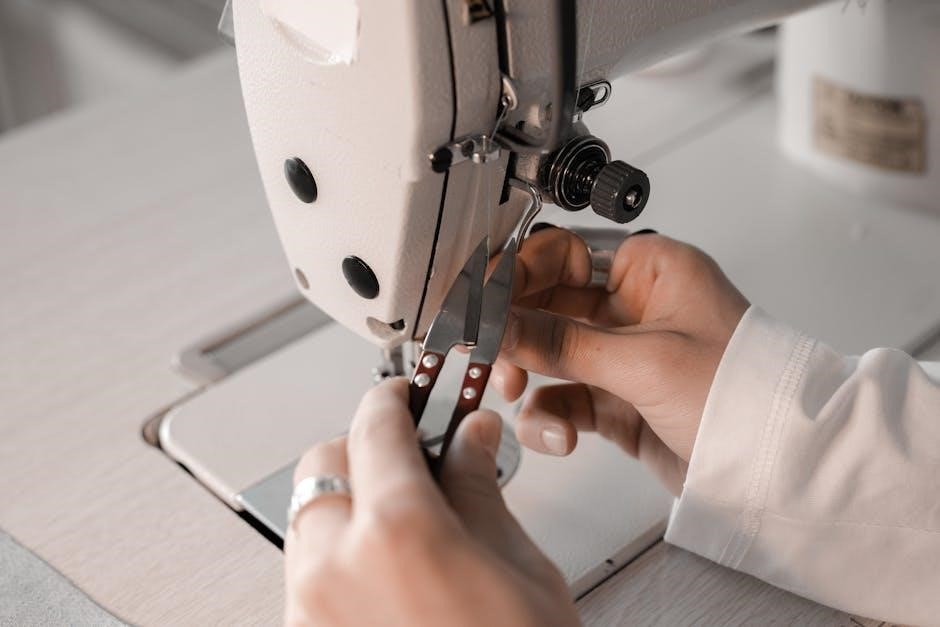The Sears Kenmore Model 158 is a versatile and reliable sewing machine, known for its durability and wide range of stitching options. Its instruction manual is essential for understanding its features, proper operation, and maintenance, ensuring optimal performance and longevity.
1.1 Overview of the Machine and Its Features
The Sears Kenmore Model 158 is a durable sewing machine designed for versatility. It offers multiple stitch options, including straight and zigzag, making it suitable for various fabrics. Known for its ease of use, the machine features a user-friendly interface and comes with essential accessories for everyday sewing tasks. Its robust design ensures long-lasting performance, catering to both beginners and experienced sewers.
1.2 Importance of Using the Instruction Manual
The instruction manual is crucial for understanding the Sears Kenmore Model 158’s features, troubleshooting, and maintenance. It provides step-by-step guides for threading, bobbin installation, and stitch selection. Without it, users may struggle with proper operation, leading to mechanical issues or inefficient use. The manual ensures safe and effective utilization of the machine, maximizing its potential and extending its lifespan.
Where to Find the Instruction Manual for Sears Kenmore Model 158
The Sears Kenmore Model 158 manual can be found on the official Sears website, online marketplaces, or sewing communities, ensuring easy access for all users needing downloads.
2.1 Official Sears Kenmore Website and Resources
The official Sears Kenmore website offers direct access to instruction manuals for the Model 158. Visit Sears Parts Direct, enter the model number in the search bar, and download the manual. This resource provides authentic and detailed guides, ensuring accurate information for optimal machine operation and maintenance. It’s a reliable source for all your sewing needs.
2.2 Online Marketplaces and PDF Downloads
Online marketplaces like eBay and specialized sewing communities offer PDF downloads of the Sears Kenmore Model 158 manual. Websites such as Sears Parts Direct and Statewide Sewing provide instant access to digital copies. These platforms ensure you can download the manual quickly, often at no cost or for a small fee, making it convenient to access the guide anytime.
2.3 Sewing Communities and Forums
Sewing communities and forums are excellent resources for finding the Sears Kenmore Model 158 manual. Websites like Reddit’s sewing subreddit or specialized sewing forums often have threads where users share links to downloadable PDF manuals. Additionally, these platforms allow you to ask questions and receive advice from experienced sewists, making them a valuable resource for troubleshooting and tips.
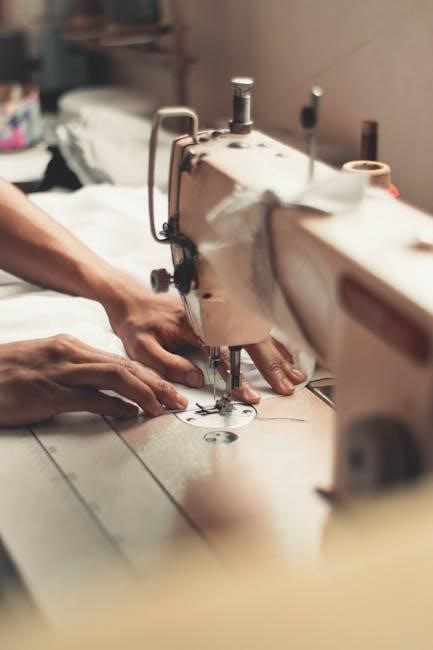
Understanding the Model Number and Its Significance
The model number is crucial for identifying the exact Sears Kenmore sewing machine and accessing the correct manual. It ensures compatibility and accuracy in operation and maintenance.
3.1 Breaking Down the Model Number 158.XXXX
The Sears Kenmore Model 158.XXXX features a specific numbering system where “158” denotes the manufacturer prefix, while “XXXX” represents the unique model identifier. This breakdown helps in identifying the exact machine version, ensuring compatibility with accessories, parts, and manuals. The complete model number is essential for accurate resource acquisition, maintenance, and repair, guaranteeing optimal performance and longevity of the sewing machine.
3.2 Why the Model Number is Crucial for Manual Accuracy
The model number is essential for ensuring the instruction manual matches the sewing machine’s specific features and requirements. Accurate model identification prevents errors in operation, maintenance, and troubleshooting. Using the correct manual guarantees proper setup, stitch selection, and repair guidance, avoiding potential damage or unsafe use of the Sears Kenmore Model 158 sewing machine.

Safety Precautions When Using the Sewing Machine
Always unplug the machine when not in use and avoid sewing loose clothing. Keep children away and ensure the work area is well-lit to prevent accidents.
4.1 General Safety Guidelines
Always use the correct needle type for your fabric to prevent breakage. Keep the work area clean and tidy to avoid tripping hazards. Ensure all accessories are securely attached before operation.
Avoid overloading the machine with excessive fabric layers. Never sew near flammable materials or leave the machine unattended while in use. Follow the manual’s guidelines for safe operation.
4.2 Electrical Safety Tips
Plug the machine into a grounded electrical outlet to prevent shocks. Avoid exposing the machine to water or moisture, as this can cause electrical hazards. Never touch electrical components with wet hands or while standing on a damp surface.
Inspect the power cord regularly for damage. If damaged, replace it immediately to avoid fire risks. Keep children away from electrical parts and ensure the machine is turned off when not in use.
Unpacking and Setting Up Your Sears Kenmore Model 158
Carefully unpack the machine and all accessories from the box. Ensure all components are included and undamaged. Place the machine on a stable, flat surface for optimal operation.
Position the sewing machine in a well-lit area with easy access to an electrical outlet, ensuring a safe and convenient workspace for sewing projects.
5.1 Unpacking the Machine and Accessories
Begin by carefully opening the box and removing the sewing machine. Inspect for any visible damage or scratches. Next, unpack all included accessories, such as the power cord, foot pedals, presser feet, and bobbins. Ensure all components are accounted for by cross-referencing the list provided in the instruction manual. Organize the accessories in a designated area for easy access during setup and use.
5.2 Setting Up the Work Area
Place the Sears Kenmore Model 158 on a sturdy, flat surface, ensuring good lighting. Position the machine near a power source and keep the work area clean and clutter-free. Use a comfortable chair and maintain a ergonomic posture. Organize threads, fabrics, and accessories within easy reach to enhance efficiency and convenience while sewing. A well-organized workspace promotes creativity and productivity.
Threading the Sewing Machine
Threading the Sears Kenmore Model 158 requires careful attention to detail. Follow the manual’s guidance to ensure proper thread flow and smooth machine operation.
6.1 Step-by-Step Guide to Threading the Machine
Start by locating the spool pin and drawing the thread through the machine’s tension discs. Guide the thread through the take-up lever, ensuring it’s seated properly. Next, insert the thread into the needle’s eye, gently pulling to remove any slack. Refer to the manual for specific diagrams to avoid common threading mistakes and ensure smooth operation.
6.2 Common Mistakes to Avoid While Threading
Common threading mistakes include not seating the thread properly in the tension discs, missing the take-up lever, or twisting the thread. Ensure the thread is taut but not overly tight. Avoid threading with the machine turned on, as this can cause misalignment. Always refer to the manual’s diagrams to prevent these errors and ensure smooth stitching.
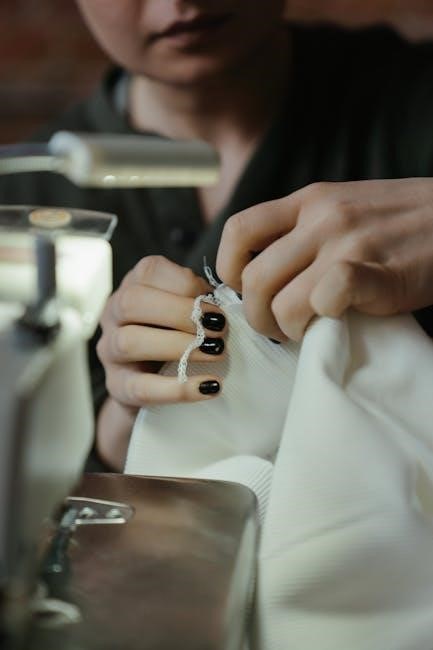
Winding and Installing the Bobbin
Winding and installing the bobbin is a crucial step for proper stitching. Use the correct thread type, ensure proper alignment, and follow the manual’s guide for accurate setup.
7.1 Proper Bobbin Winding Techniques
Proper bobbin winding ensures smooth stitching and prevents thread issues. Use the correct thread type, align the thread guide, and wind slowly. Keep tension even, avoiding loose or tight winding. Refer to the manual for specific settings. Leave a small thread tail for easy pulling. Avoid overfilling the bobbin, as this can cause sewing machine problems. Proper winding ensures consistent stitch quality and machine performance.
7.2 Installing the Bobbin in the Machine
Open the bobbin compartment by lifting the machine’s lid or removing the storage compartment. Place the wound bobbin into the bobbin case, ensuring it fits securely. Guide the thread through the machine’s tension spring. Close the compartment and pull the thread to ensure proper alignment and tension. Proper installation ensures smooth stitching and prevents thread breakage during sewing. Always follow the manual’s specific instructions for your model.
Selecting the Right Stitch for Your Fabric
The Sears Kenmore Model 158 offers various stitches, including straight, zigzag, and decorative options. Match the stitch type to your fabric’s thickness and texture for optimal results.
8.1 Types of Stitches Available on Model 158
The Sears Kenmore Model 158 offers a variety of stitches, including straight, zigzag, and decorative options. It also features utility stitches for everyday sewing and specialized stitches for heavier fabrics. The machine’s versatility makes it suitable for both basic and advanced sewing projects, catering to different fabric types and creative needs effectively.
8.2 Choosing the Appropriate Stitch for Different Fabrics
Selecting the right stitch for your fabric is crucial for achieving professional results. For lightweight fabrics like cotton or silk, use straight or delicate stitches. Denim or heavy fabrics require stronger, utility stitches. Zigzag stitches are ideal for stretchy materials, while decorative stitches enhance creativity. Always refer to the manual for specific recommendations to ensure the best outcome for your sewing projects.
Maintenance and Cleaning of the Sewing Machine
Regular cleaning and lubrication are essential to maintain the Sears Kenmore Model 158’s performance. Remove lint and old thread from the bobbin area and lubricate moving parts to ensure smooth operation.
9.1 Regular Cleaning and Lubrication
Regular cleaning and lubrication are crucial for maintaining the Sears Kenmore Model 158’s performance. Use a soft brush to remove lint and debris from the bobbin area and tension discs. Apply a few drops of sewing machine oil to moving parts, such as the handwheel and needle bar, to ensure smooth operation and prevent rust. Clean after every use for optimal results.
9.2 Checking and Replacing Worn Parts
Regularly inspect the sewing machine for worn parts, such as the needle, bobbin, and tension discs. Replace the needle frequently to avoid fabric damage. Check belts and gears for wear and tear. If parts show significant deterioration, refer to the manual for replacement guidelines or contact Sears for genuine parts to ensure optimal machine performance and longevity.
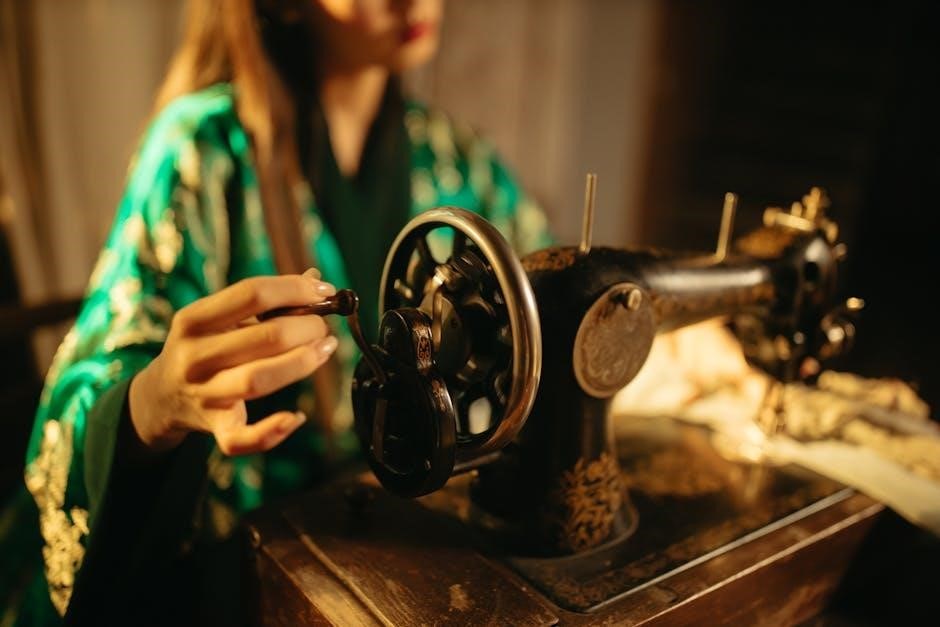
Troubleshooting Common Issues
Troubleshoot issues like the machine not turning on or the needle not moving by consulting the manual. It provides step-by-step solutions to common problems, ensuring smooth operation.
10.1 The Machine Will Not Turn On
If the machine won’t turn on, check the power cord and outlet. Ensure the power button is functioning. Consult the manual for troubleshooting steps, such as checking fuses or circuit breakers. If issues persist, contact Sears support or refer to the manual for further guidance to resolve the problem effectively.
10.2 The Needle Will Not Move Up and Down
If the needle won’t move, check if the handwheel is turning freely and not blocked. Ensure the needle is properly installed and aligned. Consult the manual for troubleshooting steps, such as checking for loose parts or incorrect settings. If issues persist, contact Sears support or refer to the manual for further guidance to resolve the problem effectively.
10.3 Fabric Not Feeding Properly
Fabric feeding issues can occur due to incorrect tension settings, misaligned feed dogs, or improper presser foot usage. Check the manual for guidance on adjusting tension and ensuring feed dogs are clean and functioning. If fabric still doesn’t move smoothly, consult the troubleshooting section or contact Sears support for assistance to resolve the feeding problem effectively.
Accessories and Attachments for Model 158
The Sears Kenmore Model 158 offers essential and optional accessories and attachments to enhance sewing capabilities, improve efficiency, and expand creative possibilities, as detailed in the subheadings.
11.1 Essential Accessories for Versatile Sewing
Essential accessories for the Sears Kenmore Model 158 include a variety of presser feet, such as the zipper foot, buttonhole attachment, and zigzag foot, which enhance stitching versatility. Additional items like bobbins, needles, and seam guides ensure efficient sewing. These accessories are designed to optimize performance and expand creative possibilities for both basic and advanced sewing projects.
11.2 Optional Attachments for Specialized Tasks
Optional attachments for the Sears Kenmore Model 158 include specialized presser feet like the quilting extension, embroidery hoop, and ruffler. These attachments enable advanced techniques such as precision quilting, decorative stitching, and gathering fabric. They expand the machine’s capabilities, allowing users to tackle complex projects with ease and creativity, making it a versatile tool for sewists of all skill levels.
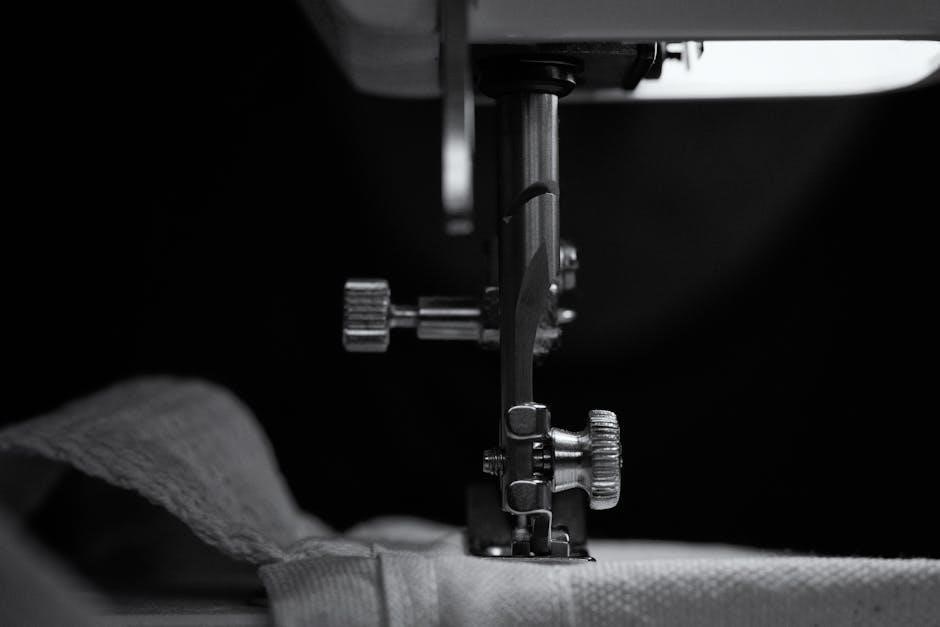
Upgrading or Replacing Parts
Upgrading or replacing parts on the Sears Kenmore Model 158 ensures optimal performance. Genuine Sears Kenmore parts are recommended for compatibility and reliability, maintaining the machine’s functionality and extending its lifespan.
12.1 Identifying Parts That May Need Replacement
Identifying parts that may need replacement on the Sears Kenmore Model 158 involves inspecting components like the needle, bobbin, and tension discs. Regular maintenance and troubleshooting can help detect worn or damaged parts early, ensuring seamless sewing operations; The instruction manual provides guidance on recognizing signs of wear and tear, enabling timely replacements to maintain performance and prevent breakdowns;
12.2 Ordering Genuine Sears Kenmore Parts
Ordering genuine Sears Kenmore parts for Model 158 ensures compatibility and performance. Visit Sears Parts Direct or the official Sears website, enter your machine’s model number, and search for the required part. Follow the checkout process to complete your purchase securely. Genuine parts maintain your machine’s efficiency and warranty, making them the best choice for repairs and upgrades.
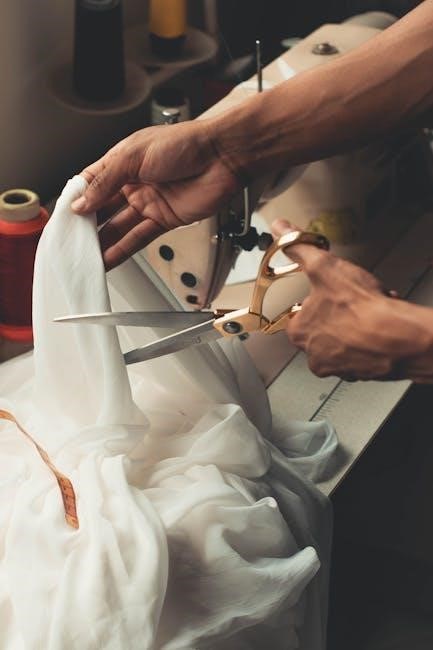
Repair and Service Options
Explore repair options for your Sears Kenmore Model 158, including DIY fixes, professional service, and genuine parts from Sears Parts Direct for optimal performance and longevity.
13.1 DIY Repairs vs. Professional Service
DIY repairs for the Model 158 can save costs, but complex issues may require professional expertise. Assess your skills and the problem’s severity to decide between self-fixes or seeking authorized service centers for reliable solutions, ensuring your machine operates smoothly without further damage.
13.2 Finding Authorized Service Centers
To locate authorized service centers for your Sears Kenmore Model 158, visit the official Sears website or Sears Parts Direct. Use your machine’s model number to find nearby centers. Ensure genuine parts and expert service by contacting Sears customer support directly for verified repair locations and maintenance assistance tailored to your sewing machine’s needs.
Tips for Beginners Using the Model 158
Begin with simple projects, practice threading, and use scrap fabric to test stitches. Refer to the manual for clear guidance and troubleshooting common issues.
14.1 Starting Your First Sewing Project
Begin by selecting a simple project, like a straight-line sewing task. Read the manual thoroughly to understand basic operations. Practice on scrap fabric to test stitches and tension. Start with a small, manageable task to build confidence and familiarity with the machine’s functions. Use the manual’s guidance to troubleshoot any issues that arise during your first project.
14.2 Practicing with Scrap Fabric
Practicing with scrap fabric helps familiarize yourself with the machine’s settings and stitch options. Use leftover material to test tension, stitch length, and width. This step ensures proper technique and prevents mistakes on actual projects. Experiment with different fabrics to understand how the machine handles various textures and thicknesses, refining your skills before starting your first sewing project.

Advanced Techniques for Experienced Users
Explore advanced sewing techniques, such as mastering zigzag and decorative stitches, and sewing thick or layered fabrics. These methods enhance creativity and precision for experienced sewists.
15.1 Mastering Zigzag and Decorative Stitches
Mastering zigzag and decorative stitches on the Sears Kenmore Model 158 enhances your sewing projects. Follow the manual’s guide to adjust stitch length and width for intricate designs. Practice on scrap fabric to achieve perfect alignment and tension, ensuring professional-looking results for embroidery, quilting, and decorative seams. This skill expands your creative possibilities in sewing.
15.2 Sewing Thick or Layered Fabrics
The Sears Kenmore Model 158 can handle thick or layered fabrics with the right techniques. Use a heavy-duty needle, adjust tension settings, and utilize the machine’s built-in features for even stitching. For dense materials like denim or canvas, consider using a walking foot attachment. Always consult the manual for specific guidance on managing heavy fabrics effectively.
The Sears Kenmore Model 158 is a reliable, versatile sewing machine. With proper use and care, it offers years of creative sewing. Keep exploring and enjoying your projects!
16.1 The Importance of Regular Practice
Regular practice is key to mastering the Sears Kenmore Model 158. It helps you understand the machine’s features, troubleshoot issues, and improve stitching accuracy. Start with scrap fabric to build confidence and gradually tackle complex projects. Consistent use enhances your skills and ensures you get the most out of your sewing machine.
16.2 Encouragement to Explore Creative Sewing Projects
Exploring creative sewing projects with the Sears Kenmore Model 158 is highly rewarding. Its versatility allows you to craft garments, home decor, and unique crafts. Start with simple projects and gradually experiment with different fabrics and patterns. Embrace the machine’s capabilities to express your creativity and enjoy the satisfaction of bringing your sewing ideas to life.
